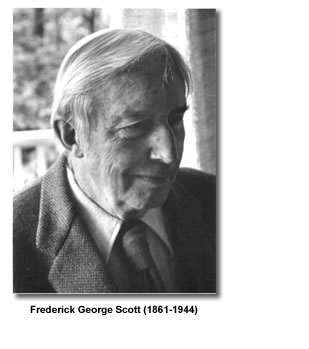FREDERICK GEORGE SCOTT (1861-1944)
by Patricia Life
Frederick George Scott is often known as “the poet of the Laurentians” since he did much of his writing in this region of Quebec. His work provides a sensitive record of the natural world and civilization’s intrusion into it. Over the course of a lengthy writing career, Scott addressed numerous themes; nature, religion, love, death, and empire were among the most prevalent. Particularly during World War I, he wrote patriotic and imperial poems. Scott is recognized as a significant early interpreter of Canada, and is one of the secondary members of the Confederation Group, which included Roberts, Carman and Lampman.
“The Poet of the Laurentians” was born in Montreal in 1861 and grew up and attended high school there. His father held the chair of anatomy at McGill University for forty years. By 1884, Scott had earned a B.A. and an M.A. from Bishop’s University in Lennoxville. He then pursued advanced studies at King’s College, London. He was ordained as a deacon in the Anglican Church in 1884, and as a priest in 1886. He rose from curate to rector in Drummondville, Quebec and then again in Montreal. In 1906, he was made Canon of Holy Trinity Cathedral, Quebec and, in 1925, was made Archdeacon of the Diocese of Quebec. He also served as an army chaplain attached to the 8th Royal Rifles, Quebec. During the First World War, he was the Senior Chaplain of the first Canadian Division overseas. He was wounded in service and after the war became the Dominion Chaplain for Canadian veterans. In 1900, he was elected to the Royal Society of Canada, and, in 1927, he received a D.D. from King’s University. He was the father of five children, and in a poetic dedication refers to his wife as “Sweet Lady, queen-star of my life and thought.” One of his sons, F. R. Scott, also became a well-known Canadian poet.
Over the course of his lifetime Scott published numerous books of poetry: Justin and Other Poems (1885), The Soul’s Quest and Other Poems (1888), My Lattice and Other Poems (1894), The Unnamed Lake and Other Poems (1897), Poems Old and New (1900), A Hymn of Empire and Other Poems (1906), Poems (1910), The Gates of Time, and Other Poems (1915), In the Battle Silences: Poems Written at the Front (1916), Poems (1918), In Sun and Shade (1928), New Poems (1929), Selected Poems (1933), and Collected Poems (1934), Poems (1936), and Collected Poems (1937). He also produced a collection of poems for the Canadian Legion, the royalties of which were awarded to veterans. Other creative efforts included a didactic novel, a mystery play, his reminiscences, and the editing of a church hymnal. |



